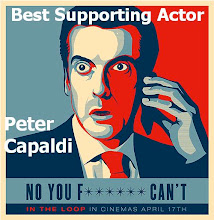 Colleen Kenny's Thoughts:
Colleen Kenny's Thoughts:From the buzz I have heard so far, Doubt this year has been somewhat underrated both by Dolphin members and critics. Yes, there are flaws in the direction and the plot isn't as thick or as driving as other films but the outstanding acting, cinematography, editing and the exploration of important themes such as, faith, compassion, virtue and doubt make up for this.
Where the film has been getting its dues is in the acting department. This is no surprise. The acting is phenomenal and Philip Seymour Hoffman as Father Flynn and Meryl Streep as Sister Aloysius give compelling performances. Viola Davis, although not in the film for very long, also delivers a memorable performance. (Amy Adams is also convincing as Sister James.)
The themes of compassion and virtue are intensely explored through Sister Aloysius (Streep) and Father Flynn’s (Hoffman) relationship. Also, Sister James ( Adams ) helps guide us through this exploration as many of her thoughts seem to stand in for the audiences. Just when you feel Sister Aloysius (Streep) is the pessimist villain of the film she suddenly makes you think again in possibly the best scene of the film when her and Flynn (Hoffman) are in a heated argument. In this scene, Aloysius grabs her rosary and shows her commitment to justice and virtue. I agree that a little more complexity could have been brought in to show viewers more of Flynn’s life or his relationship to the children at the school.
While there has been some Dolphin controversy surrounding the sharply angled shots this does not take away from the overall effectiveness of the cinematography. A scene that particularly displayed Roger Deakins ability as a cinematographer to me is when Flynn is giving the sermon about gossip and the woman ripping a pillow open. The image of feathers flying over a 1960s New York evening has stuck with me days after seeing the film. Also, shots of the church throughout the film are quite powerful.
While I agree there were some flaws in the direction and perhaps the story could have used some beefing up, Doubt overall was one of the most entertaining and thought provoking movies of 2008.
Drew Dahle's Thoughts:
In response to some claims that this film doesn't have much of a plot, I must write this paragraph. This film does indeed have a "plot" and I found it to be particularly driving and tightly edited by last year's Dolphin winner Dylan Tichenor. The plot is sharply focused and very singular. It was refreshing to me as a viewer for a film to leave out subplots and thoroughly delve into its story, subject matter and the life/lives of its character(s). Cinema has seen what seems like millions of films based on whether a character is guilty or innocent, and even the good ones often feel a little contrived because of how artificial the process of discovering "the truth" in film is, even when its engaging. Doubt doesn't feel contrived. It feels the way a situation like it would feel. We don't know whether Father Flynn is guilty or not, we might think we do, but there is no moment of transparency where the audience learns "the truth." There is a "truth" but only John Patrick Shanley and the actors who played Flynn know it. So like when evaluating a person's innocence in life, your verdict is based on what you know, as well as, how much you trust (and like) the accused and how much you trust and like the accuser. Shanley recreates this experience and its emotions for the audience in an engrossing cinematic fashion. There is no artificial plot device or contrived deployment of clues which may or may not be red herrings. The drama of the story is of not knowing, of being pulled in two opposite but equally viable directions.
As one should assume, the acting is obviously phenomenal. Meryl Streep gives the best female lead performance I've seen all year as a monstrous but convicted nun and her scenes with her "adversary" Philip Seymour Hoffman are particularly fantastic--they seem push each other to greater heights. I think I remember the filmmaker John Patrick Shanley saying for the role of Father Flynn he needed someone who could make Streep sweat. You can't do any better than P.S. Hoffman. He gives a great charismatic performance, confusing the situation surrounding his potential misdeed, and functions as a foil for Streep's character. Sister Aloysius is an unlikable person doing a, potentially, right thing while Father Flynn is a very likable person who has done a, potentially, wrong thing. The other two central performances by Amy Adams and Viola Davis are both great in very different ways. Davis is essentially only in one scene where she pleads for her son and exhibits traces of heartbreak and desperation in deciding what is best for him. She creates a rather complex character in a pretty short amount of time which is quite difficult. Adams's character, unlike the other characters, doesn't really have any dramatic, explosive scenes but her performance still manages to stand out. She is pulled back and forth between Flynn and Aloysius. While also providing the film with ocassional comic relief, Adams facial expressions really embody the sense of dread and confusion she feels regarding the situation in the rectory and by the film's end, under Aloysius's influence, her demeanor has noticably hardened, both in her class and with Aloysius.
Overall, Shanley does a suitable job directing the feature. There are only a couple instances where his lack of directing experience and the material's theatre origins show through. The former happens a couple times with unnecessary, extremely angled shots (a small blemish on Roger Deakins's otherwise fantastic cinematography) and latter only once or twice very briefly when the more dramatic moments approach staginess. The direction, however, appropriately assists Shanley's excellent,thought provoking screenplay, which everyone knows is the real star here.


No comments:
Post a Comment